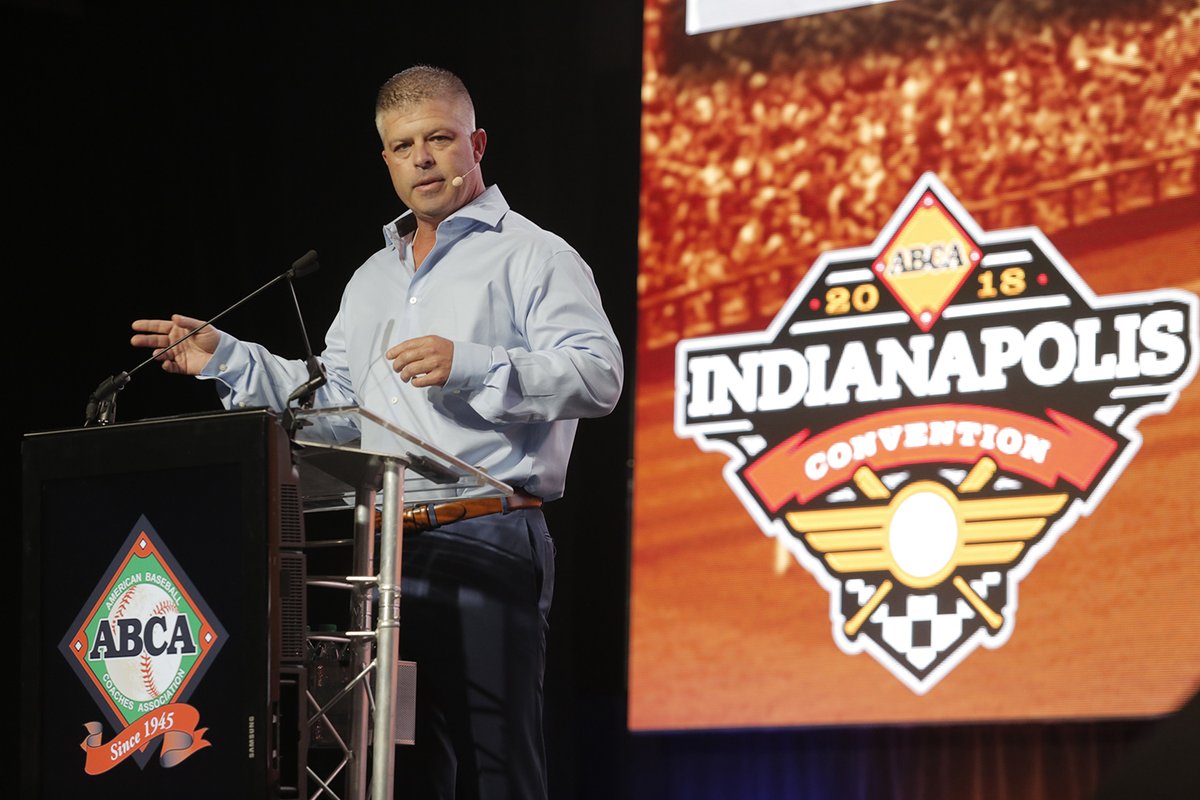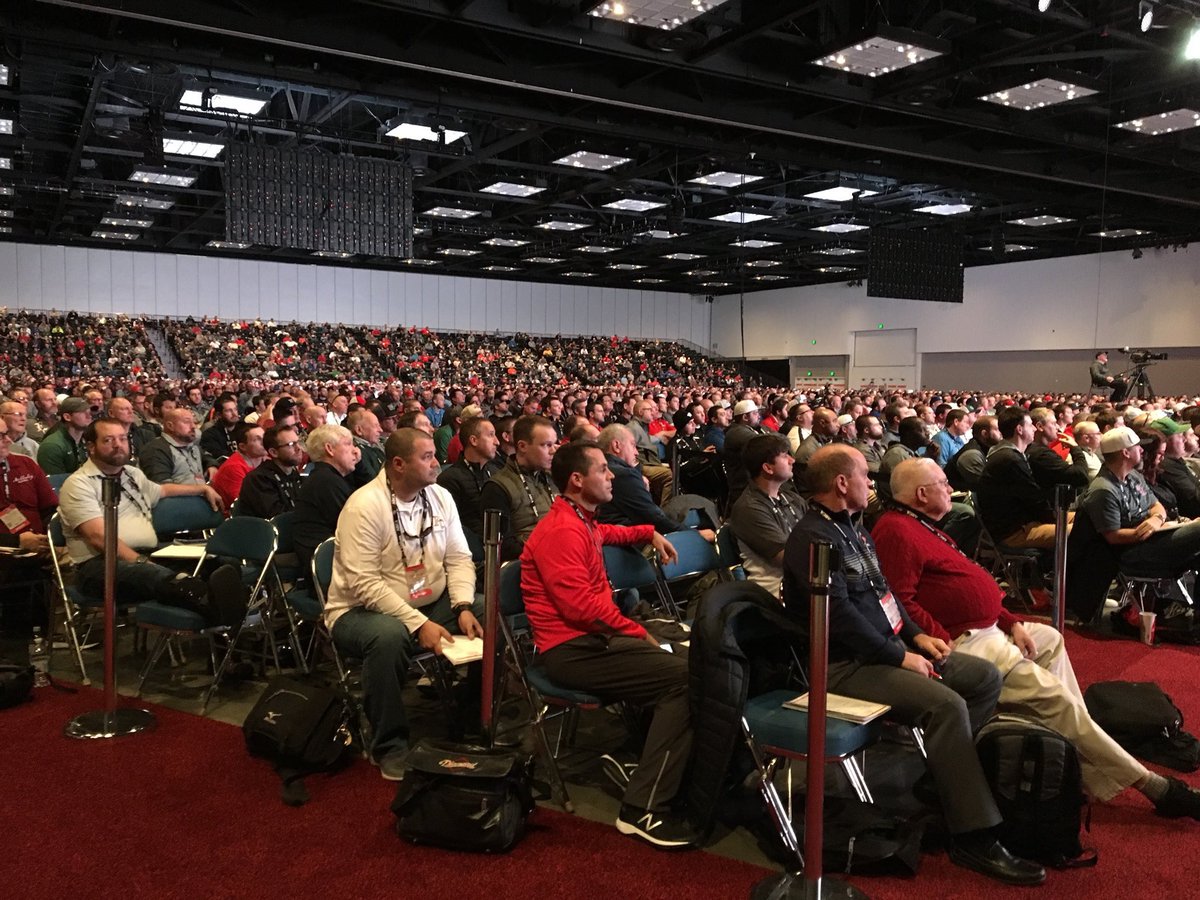Each January, the baseball coaches of america (@ABCA) join forces somewhere in this great country for three days of baseball, baseball, baseball. It’s an amazing weekend that I look forward to every year, and one that I was able to participate in this year as a clinician # Hello bucket-list!
THE POWER OF TIME
For much of the first 5-6 years, I was a nervous, lonely attendee.. Eating solo, walking the show floor with business cards in hand, I had many an uncomfortable exchange with those more experienced than me. But!! Much like the challenge of approaching that special someone you think has a twinkle in their eye, I did it. I swallowed my pride, introduced myself, and struck up a conversation. Fast-forward another 10 years, and I can’t make it more than 100 feet without a hug and a handshake.
Much like on a team, I had several mentors that looked out for me. Invited me to an event that they thought would be good for me, introduced me to those they thought would connect well, and shared insight learned over the years. I now see coaches as having an ego “bell curve.” They start out humble, eager to learn during the first several years… then they learn a thing or two and think their poop don’t stink during years 5-7… and finally, they crest that ego-hump and come racing down to earth as the years pile up. I am blown away by the grace, humility, and willingness to share that those with 25+ years of experience show. It’s something that I don’t take for granted. In fact, I try to take advantage of it! And I intend to follow their lead for sure and return the favor to those coming up behind me.
I identify two things that have happened to me over the years, that I also relate to how baseball players change and grow as they age and mature:
- I’ve gotten older. I care less about what people think. I’m not embarrassed or nervous to introduce myself. I’m also much more comfortable in my own skin and not worried about being someone that I’m not. And I’m definitely okay with walking by the hotel bar and heading to my room early!
- I’ve gotten better. I’m more experienced. I’m a better coach, businessman, and speaker. I’ve made SO so many mistakes, and learned from them. Honestly, I’m really excited for the next 10 years of my business career and intend to move closer and closer to what I believe the goal of life is:
Use my strengths in service to others
BALANCE BETWEEN NOW AND THEN – THE BEST OF BOTH WORLD
Being a pitching guy, I experienced this trend 4-5 years ago in our area. As science and analytics started becoming more mainstream (led by the guys at Cressey Sports Performance, Texas Baseball Ranch, and Driveline are three of my favorite leaders in the space), there was a movement to go faster down the hill. Big leaguers do it – thus – my 8-year old should start learning that way now.
Nowadays, we are seeing it on the hitting side of things with “lifting the ball.” Hitting the ball in the air. “You don’t get paid for ground balls. Hit homers.” Says the 6’3, 225 pound MLB all-star.
Both scenarios are probably accurate. Pitchers DO want to explode down the mound, all the while executing one of the most difficult athletic feats on the planet. And hitters DO want a launch angle of 20-degrees, with a spin rate of ???, and a travel-distance of 472 feet. All while trying to do THE most difficult thing in sports – hit a major league slider.
But, where’s the common sense when it comes to coaching high school kids or even younger ballplayers? If my 5’3, 100 lbs, 12-year old left-fielder, hits 96 fly balls to right-center field in a season… and goes 2-96 for an average of .021… He might be right on pace to be a major league all-star, but HE AIN’T PLAYING NEXT YEAR!!! In the same vein, if my 10-year old pitcher gets moving down the hill, leading with his front hip, and dragging the heck out of his arm… he might be maximizing his velocity and setting himself up for a bid payday as the first pick in the draft… but he’s gonna hit 4 batters per inning and be yanked before finishing the second inning!
THE COACHING PLAN
With an understanding of the big picture, and what it takes to have success at the highest levels, what should I teach my kid at 8 / 12 / 16 / 20? I believe we need to do BOTH of two goals:
-
- Maximize the opportunity for current success
- Develop the athlete for long-term opportunity
Since I’m a pitching guy, to me this means allowing my athlete the best chance to throw strikes now! While also teaching and introducing the methods and technique needed to succeed at the highest levels. The biggest challenge in achieving both goals is the plan to follow. How do I teach the principles of momentum and energy traveling down the mound… without drifting, leaving the arm behind, and losing the ability to command the fastball? With regard to the glove arm, what do I teach first (at 8 years old)? And where do I go from there (at 12 years old)?
I think my book does a good job spelling out that path for coaching pitchers. And one of the reasons why I’ve found my niche in coaching coaches to work with their own athlete. Once you get beyond a certain level of development, however, it’s just as my wise nephew Seth tells me: “Everybody’s different.” Yes Seth, yes they are. And THAT’S why there are private pitching instructors teaching different athletes different training plans.
THE GREAT DIFFERENTIATOR
I always, always, always listen to the first speaker of the convention. The coach of the winning team from last summer’s NCAA College World Series bats lead off. And I am not kidding you, every single one of them discusses their TEAM in describing why they were champions. They don’t describe how many home runs they hit, or how many bullpen arms clocked pitches over 90mph. Nope, they talk about cohesion, accountability, maturity, overcoming adversity, and “magic.” I believe the coaches that stand up as national champions are master communicators, life-coaches, psychologists, and relationship counselors. Oh, and they’re great baseball coaches too. There are tons of great baseball coaches though, but only a select few of those leaders can also build and nurture a championship culture, a gritty approach, and a resilient attitude.

This year’s first presenter was Kevin O’Sullivan from the University of Florida. He said something very interesting: This season was one in which he did the least amount of coaching that he can remember. With two young kids, he said that life forced him to back off a bit. Whether he had intended to or not, the result was that he gave his athletes a “longer leash” that he might have in years past. They had to figure stuff out on their own, fight through some early struggles, and learn from their mistakes. As an example, he spoke to their start in league play (0-6)… and how he might have freaked out and called a bunch of team meetings in years past. But with family dinner at 6pm and homework to get done with the kids, he just couldn’t do it. His lesson – shut your mouth and guide the process. What a gem!
Perhaps his most powerful lesson came in the form of a championship observation. As he was reflecting upon winning the #1 goal of any non-professional baseball coach, he realized that the prize really wasn’t that great. He felt relief, lots and lots of relief. And he was ecstatic-happy for his players – kids that had become family to him over several years of time together. But personally and professionally, the high came and went very quickly. There was an ego boost for sure, and an opportunity to puff out the chest amongst his peers. But quickly that shine was gone. And Coach O’Sullivan was left with the experiences along the way. The good times and the bad times. The relationships with his coaches, his players, and the fans. The process… not the result.
Oh snap! I wanted to stand up and hug the man. Here is the dude that just won the College World Series. We all saw it! Freaking Omaha! And he’s basically saying, “Guys, it’s not that great. Enjoy the road you are on, be present with your kids. Lose yourself every day at practice and rear young men. Teach those players to be champions, to handle their business, and do the right thing.”
Preach O’Sullivan. Preach.
DK out!!!

“Enjoy the Process!” Love it!